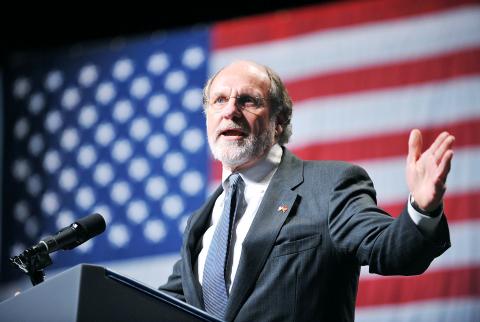The European debt crisis claimed its first major US casualty on Friday when Wall Street star Jon Corzine resigned as chief executive of collapsed broker MF Global.
The former head of Goldman Sachs and former New Jersey governor and senator stepped down four days after the company filed for bankruptcy as creditors cut off funding on worries over its US$6.3 billion investment in risky eurozone sovereign debt.
Futures market operator CME and the Commodity Futures and Trading Commission have said as well that they are investigating the apparent disappearance of more than US$600 million of client money from accounts at CME, money feared diverted for the company’s own needs, according to media reports.

Photo: AFP
Also in question is whether the company has been straight with its accounting, after reporting a healthy US$41 billion in assets and US$39 billion in liabilities in its most recent quarter.
MF Global said early on Friday that Corzine was giving up a promised US$12 million departure payout as he stepped down.
“Mr Corzine has confirmed that he will not seek severance payments in connection with his resignation,” the company said in the terse statement.
It was a hard takedown for the aggressive veteran of US high finance, who took over the company last year with hopes of building it into a Wall Street investment banking power like his former employer Goldman Sachs.
Corzine, 64, shot up through Goldman’s ranks in the 1980s to be named chairman and chief executive in 1994.
Under his lead during the next five years, the company re-established its pre-eminence in investment banking and Corzine helped prepare it to go public in 1999, when he was pushed out by rival Henry Paulson.
He reportedly earned US$400 million on Goldman’s share sale and tapped that for a successful bid as a Democrat for a seat in the US Senate representing New Jersey.
In 2005 he left that job after he was elected the state’s governor.
His tenure scarred by the economic recession, he lost his 2009 re-election bid and moved to head MF Global, the former Man Group brokerage split off four years ago to focus on futures, options and derivatives.
Company employees and US media said that Corzine quickly moved MF Global into heavy trading of its own capital, rather than just broking for customers, aiming to quickly build it into a Wall Street power.
A former staffer said that move was central to its ultimate collapse — and that it was not only risky positions in European sovereign debt, but also other financial and commodity instruments.
“The biggest thing is that they increased proprietary trading activity that has not done well. We know about the eurozone holdings, but also the energy books and the fixed income, so it’s really the worst of all worlds,” the person said.
Beginning last month, MF Global saw its credit lines being cut after markets became concerned over a lack of adequate capital and its US$6.3 billion bet on the short-term debt of financially beleaguered Belgium, Italy, Spain, Portugal and Ireland.
Regulators also pressed MF Global to attract more capital, the New York Times and the Wall Street Journal reported, but Corzine personally talked them back down.
Then on Oct. 26 the company reported its fourth loss in six quarters, US$191.6 million, blaming “stressed markets” and saying it was “focusing on preserving capital and liquidity.”

Intel Corp chief executive officer Lip-Bu Tan (陳立武) is expected to meet with Taiwanese suppliers next month in conjunction with the opening of the Computex Taipei trade show, supply chain sources said on Monday. The visit, the first for Tan to Taiwan since assuming his new post last month, would be aimed at enhancing Intel’s ties with suppliers in Taiwan as he attempts to help turn around the struggling US chipmaker, the sources said. Tan is to hold a banquet to celebrate Intel’s 40-year presence in Taiwan before Computex opens on May 20 and invite dozens of Taiwanese suppliers to exchange views

Application-specific integrated circuit designer Faraday Technology Corp (智原) yesterday said that although revenue this quarter would decline 30 percent from last quarter, it retained its full-year forecast of revenue growth of 100 percent. The company attributed the quarterly drop to a slowdown in customers’ production of chips using Faraday’s advanced packaging technology. The company is still confident about its revenue growth this year, given its strong “design-win” — or the projects it won to help customers design their chips, Faraday president Steve Wang (王國雍) told an online earnings conference. “The design-win this year is better than we expected. We believe we will win

Chizuko Kimura has become the first female sushi chef in the world to win a Michelin star, fulfilling a promise she made to her dying husband to continue his legacy. The 54-year-old Japanese chef regained the Michelin star her late husband, Shunei Kimura, won three years ago for their Sushi Shunei restaurant in Paris. For Shunei Kimura, the star was a dream come true. However, the joy was short-lived. He died from cancer just three months later in June 2022. He was 65. The following year, the restaurant in the heart of Montmartre lost its star rating. Chizuko Kimura insisted that the new star is still down

While China’s leaders use their economic and political might to fight US President Donald Trump’s trade war “to the end,” its army of social media soldiers are embarking on a more humorous campaign online. Trump’s tariff blitz has seen Washington and Beijing impose eye-watering duties on imports from the other, fanning a standoff between the economic superpowers that has sparked global recession fears and sent markets into a tailspin. Trump says his policy is a response to years of being “ripped off” by other countries and aims to bring manufacturing to the US, forcing companies to employ US workers. However, China’s online warriors